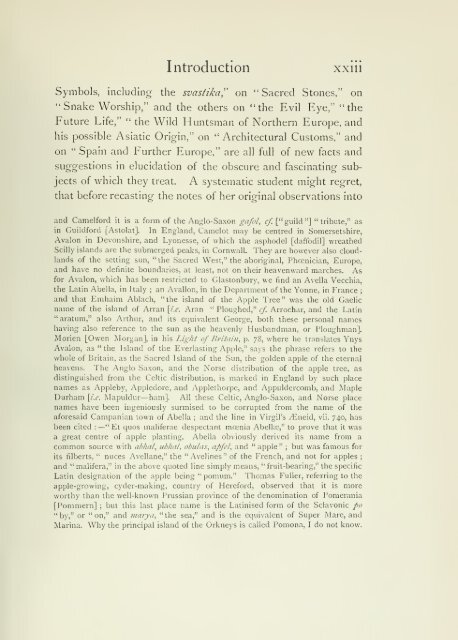Download Ebook - Free History Ebooks
Download Ebook - Free History Ebooks
Download Ebook - Free History Ebooks
Create successful ePaper yourself
Turn your PDF publications into a flip-book with our unique Google optimized e-Paper software.
Introduction xxiii<br />
Symbols, including the svastika" on "Sacred Stones," on<br />
"Snake Worship," and the others on "the Evil Eye," "the<br />
Future Life," " the Wild Huntsman of Northern Europe, and<br />
his possible Asiatic Origin," on " Architectural Customs," and<br />
on " Spain and Further Europe," are all full of new facts and<br />
suggestions in elucidation of the obscure and fascinating sub-<br />
jects of which they treat. A systematic student might regret,<br />
that before recasting the notes of her original observations into<br />
and Camelford it is a form of tlie Anglo-Saxon gafol, cf. ["guild"] "tribute," as<br />
in Guildford [Astolat]. In England, Camelot may be centred in Somersetshire,<br />
Avalon in Devonshire, and Lyonesse, of which the asphodel [daftbdil] wreathed<br />
Scilly islands are the submerged peaks, in Cornwall. They are however also cloud-<br />
lands of the setting sun, "the Sacred West," the aboriginal, Phosnician, Europe,<br />
and have no definite boundaries, at least, not on their heavenward marches. As<br />
for Avalon, which has been restricted to Glastonbury, we find an Avella Vecchia,<br />
the Latin Abella, in Italy ;<br />
an Avallon, in the Department of the Yonne, in France ;<br />
and that Emhaim Ablach, "the island of the Apple Tree" was the old Gaelic<br />
name of the island of Arran {i.e. Aran " Ploughed," cf. Arrochar, and the Latin<br />
"aratum," also Arthur, and its equivalent George, both these personal names<br />
having also reference to the sun as the heavenly Husbandman, or Ploughman].<br />
Morien [Owen Morgan], in his Light of Britain, p. 78, where he translates Ynys<br />
Avalon, as "the Island of the Everlasting Apple," says the phrase refers to the<br />
whole of Britain, as the Sacred Island of the Sun, the golden apple of the eternal<br />
heavens. The Anglo Saxon, and the Norse distribution of the apple tree, as<br />
distinguished from the Celtic distribution, is marked in England by such place<br />
names as Appleby, Appledore, and Applethorpe, and Appuldercomb, and Maple<br />
Durham \i.e. Mapuldur— ham]. All these Celtic, Anglo-Saxon, and Norse place<br />
names have been ingeniously surmised to be corrupted from the name of the<br />
aforesaid Campanian town of Abella ; and the line in Virgil's .4ineid, vii. 740, has<br />
been cited : — "Et quos maliferae despectant mosnia Abella;," to prove that it w'as<br />
a great centre of apple planting. Abella obviously derived its name from a<br />
common source with abhal, tib/iai, obulas, apfcl, and " apple" ; but was famous for<br />
its filberts, " nuces Avellane," the " Avelines" of the French, and not for apples ;<br />
and "malifera," in the above quoted line simply means, "fruit-bearing," the specific<br />
Latin designation of the apple being " pomum." Thomas Fuller, referring to the<br />
apple-growing, cyder-making, country of Hereford, observed that it is more<br />
worthy than the well-known Prussian province of the denomination of Pomerania<br />
but this last place name is the Latinised form of the Sclavonic po<br />
[Pommern] ;<br />
"by," or "on," and inarya, "the sea," and is the equivalent of Super Mare, and<br />
Marina. Why the principal island of the Orkneys is called Pomona, I do not know.

















